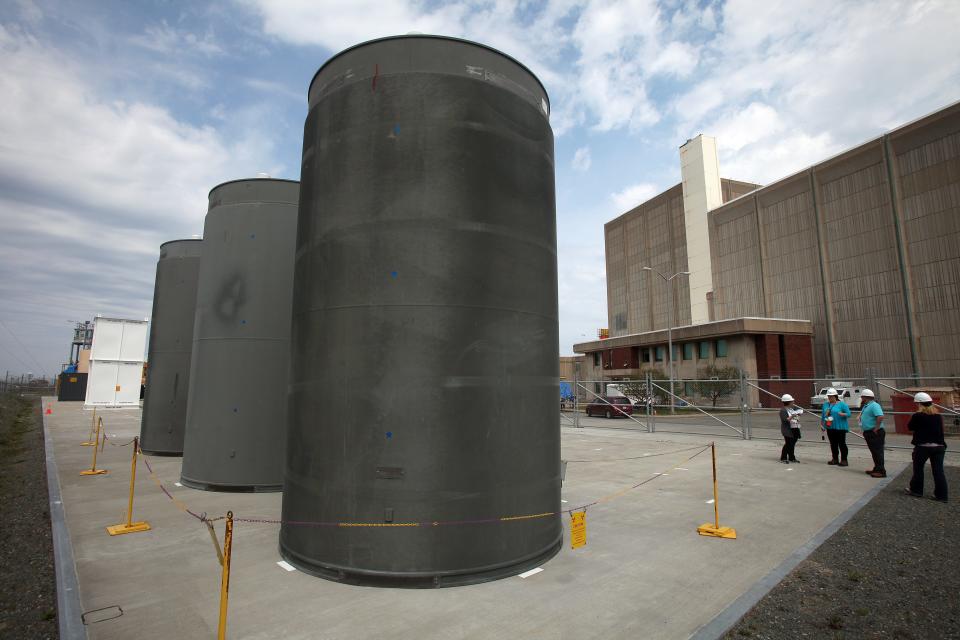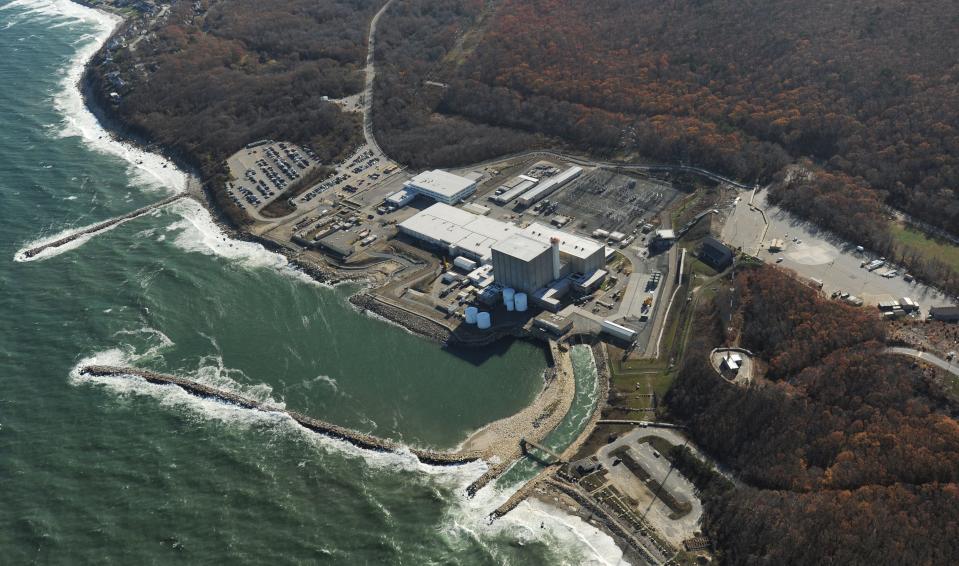'We've done this before.' Holtec denied discharge into Cape Cod Bay, in draft state ruling
Holtec International will not be allowed to discharge industrial wastewater from the Pilgrim Nuclear Power Station into Cape Cod Bay if a draft decision announced Monday afternoon by the Massachusetts Department of Environmental Protection becomes final.
The draft requires a 30-day public comment period before the state environmental protection agency can set the seal on its decision. That decision would deny a permit modification the company sought with an eye toward discharging up to 1.1 million gallons of wastewater — treated beforehand but still containing low-level radionuclides — into the bay. The water comes from the fuel rod storage pool.
The comment period is open through 5 p.m. Aug. 28.

Here's how Holtec responded to the state's denial of its permit modification.
The decision comes a little more than three months after Holtec filed for state and federal permits to authorize the wastewater discharge as part of the plant's decommissioning process.
The company "will continue with the EPA modification process and will look to evaluate all options related to (the) ultimate disposition of the water used in plant operations for the last 50 years," according to the statement.
Responding by email to an inquiry from the Times, Holtec stated that the company is “disappointed by the state’s denial of our permit modification for discharge of treated water from Pilgrim Station well within safe limits."

"This process has already delayed the completion of the project for an additional four years, impacted the workforce on site and further changes when the site can be returned to be an economic driver for the Plymouth community," the statement noted.
Local environmental groups see the proposed discharge as a threat to Cape Cod Bay
Regional environmental groups such as the Association To Preserve Cape Cod have argued that discharge of radioactive water into Cape Cod Bay — even if it is low-level — would pose "an unacceptable threat to the bay’s environment, human health, the Cape’s finfishing and shellfishing industries, and the economies of Cape Cod Bay communities."
Association Executive Director Andrew Gottlieb said Monday afternoon the state agency's determination is "an important day for Cape Cod," even though the decision still has to undergo a public comment period.
"It would have been nice to put a stake in the heart of the vampire today," Gottlieb said, but he understands the state agency must "follow proper procedure to ensure Holtec does not have a claim against the department for not hearing them out."
Diane Turco, who is part of environmental activist groups Cape Downwinders and Save Our Bay, said she and others who have been fighting against Holtec's proposal to release wastewater into Cape Cod Bay are "very excited that the DEP has done their job" and determined the discharge would be illegal according to state environmental law. At the same time, she stressed, "We must stay vigilant" to ensure the ruling is followed once it becomes official.
Pointing out ongoing protests related to the company in New York, New Mexico and Michigan, she said this decision by Massachusetts could have far-reaching effects.
"If we can stop Holtec from dumping," she said, "that's precedent-setting."
Oceans Sanctuaries Act part of Cape Cod group's analysis
Gottlieb said his organization argued that the company's proposal to release treated wastewater from the spent fuel pool, torus, dryer separator and reactor cavity is not in keeping with the state's Ocean Sanctuaries Act. The state environmental agency cites the statute in its draft determination.
"The APCC's analysis provided the basis upon which this determination was made," Gottlieb said. "As an organization, we're really pleased that the Healey administration listened to our legal analysis and found it worthy of their due consideration and using it as the basis of their denial."
Earlier this year, the organization submitted a detailed legal analysis to Gov. Maura Healey and Lt. Gov. Kim Driscoll pointing out that the Ocean Sanctuaries Act "explicitly prohibits the discharge of pollutants into a designated Ocean Sanctuary, except for a specific exemption that allows for 'the operation and maintenance of existing municipal, commercial or industrial facilities and discharges where such discharges or facilities have been approved and licensed by appropriate federal and state agencies.'"
Gottlieb explained that Holtec’s proposed discharge is not "an existing discharge” because it was not preexisting when the Cape Cod Bay Ocean Sanctuary was created in 1971. The radioactive water discharge proposed by Holtec, he pointed out, is related to the Pilgrim facility's decommissioning process — the plant was commissioned in December of 1972, and decommissioned in May of 2019.
“The proposed discharge is new and cannot be considered ongoing ‘operation and maintenance’ of an active power generation facility and therefore must be viewed as a new industrial discharge,” Gottlieb said. “Holtec arrogantly ignored a law that has been on the books for over 50 years and tried to convince everyone that Massachusetts was powerless to stop them. They were wrong and APCC made that clear and DEP is proceeding to fulfill its obligation under the law.”
'We've done this before'
U.S. Rep. William Keating, D-Mass., whose district covers the Cape and Islands, said Monday that in the years since the plant was shuttered, Holtec has pointed at the exemption that allowed some wastewater discharge while the plant was still generating power as permission to continue doing so after the plant shut down.
"They would always point (to that) and say 'we've done this before,'" he said. "But that was under an exemption where they were an active supplier of energy. They don't supply energy anymore."
In 2022: Will state law stop Pilgrim from dumping radioactive water in Cape Cod Bay? It's complicated
The state has its own power to prohibit the release of wastewater, Keating said, "and they're exercising it."
"This act here, I think, strongly will close the door" on Holtec's plan, he said.
The New England Regional Office of the U.S. Environmental Protection Agency on Tuesday indicated the agency also received an application earlier this year from Holtec requesting to modify its existing National Pollutant Discharge Elimination System permit, issued in January of 2020, to authorize the discharge of treated spent fuel pool water and other wastewater associated with decommissioning activities into Cape Cod Bay.
The federal agency has not yet reached any determination regarding the application, and now "will need to determine the implications of the state’s draft decision" on its review of the federal permit modification request, according to the New England Region public affairs office.
"EPA expects to be in communication with the state on this subject in the days and weeks ahead," the agency said in an email.
Healey approves of initial decision from state environmental officials
In a statement released Monday afternoon, Healey said, "I’ve long expressed serious concerns about Holtec’s proposal to discharge decommissioning wastewater into Cape Cod Bay."
"I’m glad to see this tentative decision from MassDEP finding that issuing a permit to Holtec for this discharge would violate the Ocean Sanctuaries Act," she said. "Our administration is committed to protecting our precious environmental resources and we will continue to monitor Holtec’s role in decommissioning the now-closed Pilgrim Nuclear Power Station."
What are the options to get rid of the treated Pilgrim wastewater?
There are other viable options for getting rid of the wastewater, Keating said, including trucking it away to the US Ecology Idaho waste facility near Grand View, Idaho. He noted it's the same facility where wastewater from the decommissioned Vermont Yankee nuclear power station was sent. While it is a more expensive disposal option, Keating said, the company should consider the environment over profit.
"Why take risks environmentally when you don't have to?" he said, calling the state's pending determination "a very strong action."
Comments may be submitted to MassDEP electronically at massdep.npdes@mass.gov. Written comments may be submitted to: MassDEP Surface Water Discharge Permitting Program, 100 Cambridge St., Suite 900, Boston, MA 02114.
Heather McCarron writes about climate change, environment, energy, science and the natural world. Reach her at hmccarron@capecodonline.com, or follow her on Twitter @HMcCarron_CCT
Thanks to our subscribers, who help make this coverage possible. If you are not a subscriber, please consider supporting quality local journalism with a Cape Cod Times subscription. Here are our subscription plans.
This article originally appeared on Cape Cod Times: State to ban nuclear water discharge in Cape Cod Bay. How to comment

